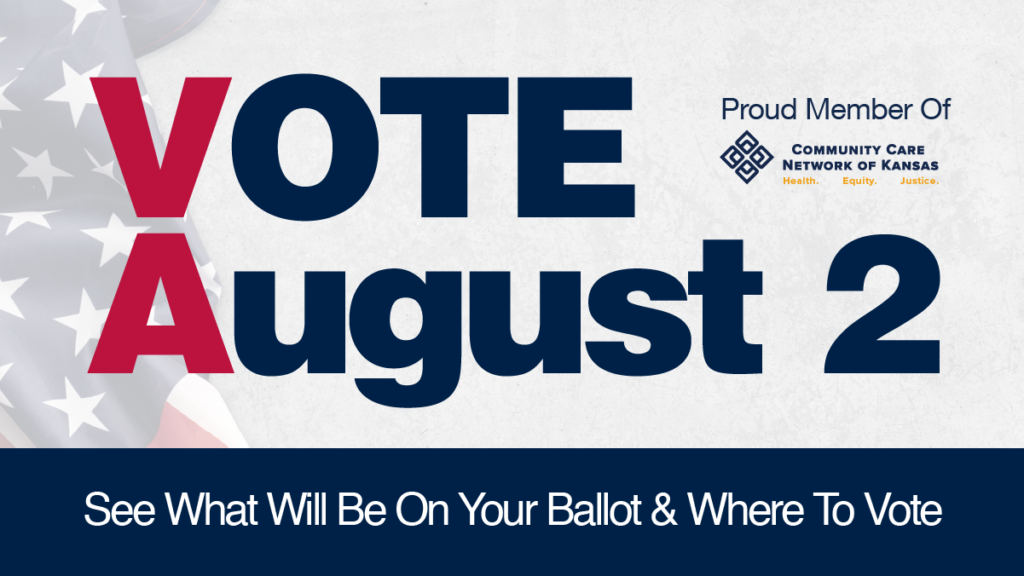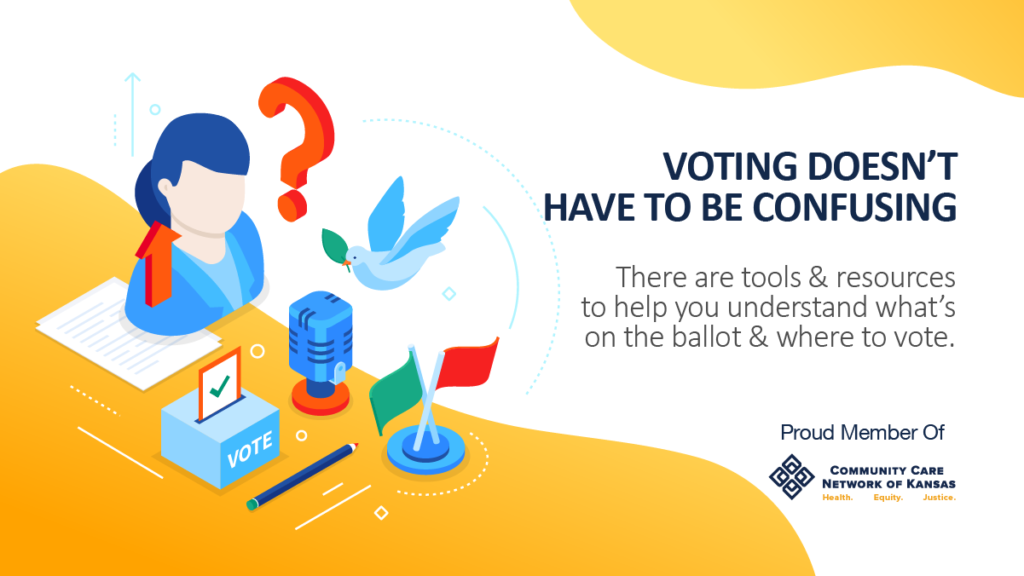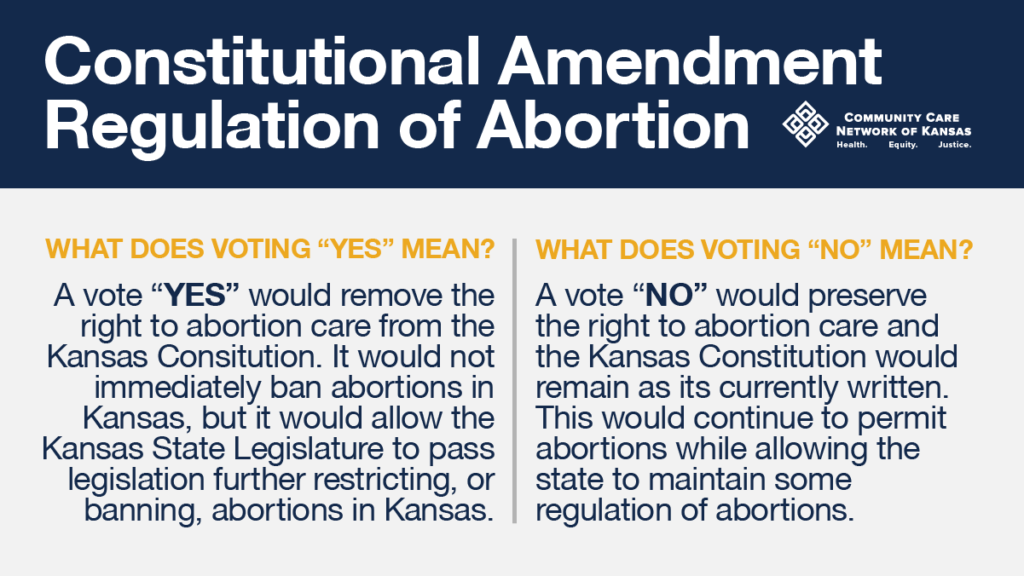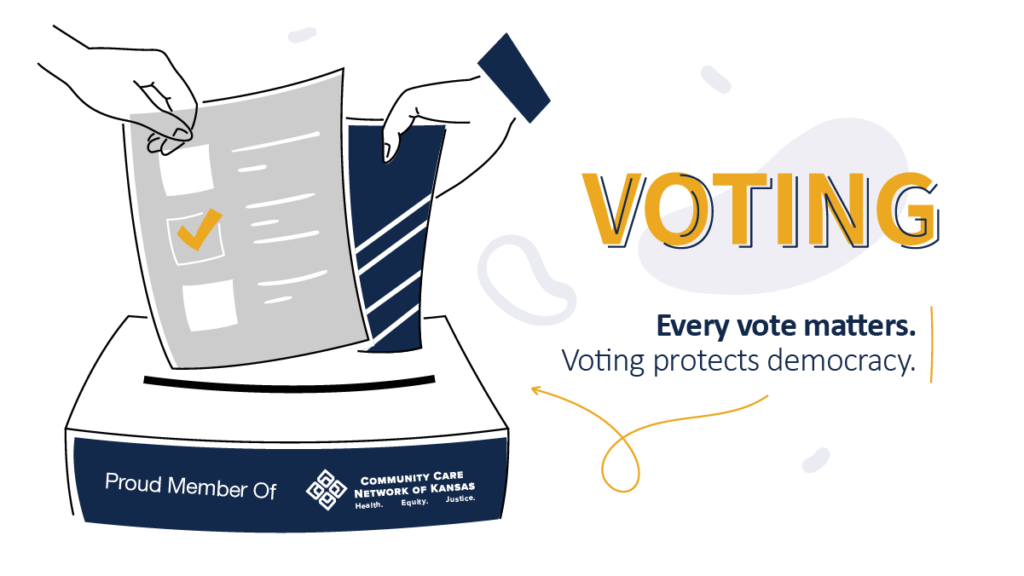Kansas Primary Election: Tuesday, August 2
Jul 25, 2022
Tuesday, August 2, 2022 is the Kansas Primary election. If you are registered to vote, this is an important election that can help shape our communities to be representative of your wants and needs. You do not have to be affiliated with a party (Republican or Democrat) to vote on certain measures, such as the Kansas Abortion Amendment. We’ve put together a simple guide to help you make sure your voice is heard.

Am I Registered To Vote?
The Kansas Primary Election will have a number of primary elections for members of the Republican and Democratic parties. The results of the primary dictate who will run for offices in the General Election on November 8, 2022.
If you are an Unaffiliated (Independent) or Libertarian voter (Independent), you can’t vote for members of the Republican or Democratic party during the primary, but you can vote on measures such as the Constitutional Amendment regarding the regulation of abortion in Kansas.
To check your Kansas voter registration, apply to vote by mail, or track your advance ballot status: Visit KSVotes.org.
What Will Be On My Ballot?
Want to see what will be on your ballot before you vote? KSBallot & The Voter Network have an online tool that allows you to enter your address to see who is on your ballot, find out where to vote early and on election day, and even set reminders to go vote!
There are a lot of different reasons why people don’t vote. Not being able to find out who is on your ballot or where to vote should not be one of them.
Where Do I Go To Vote?
There are a number of great tools you can use to look up where your polling place is, what the hours are, and how to get there. You can use the Voter Network site listed above, check out Vote 411, or go to the Kansas Secretary of State’s VoterView site to look up your polling place.

What Is The Kansas Abortion Amendment?
In 2019, the Kansas Supreme Court ruled that the state constitution includes a right to bodily autonomy. The justices stated that this included abortion.
As a result, the Kansas Legislature is barred from passing laws that restrict access to abortion. Any abortion restrictions must clear an extremely high level of “strict scrutiny” from the court to become law, and most restrictions on abortion, including a total ban, would be considered unconstitutional in Kansas.
The amendment, referred to as the Value Them Both amendment, would add the following language to the state constitution if passed.
“Regulation of abortion. Because Kansans value both women and children, the constitution of the state of Kansas does not require government funding of abortion and does not create or secure a right to abortion. To the extent permitted by the constitution of the United States, the people, through their elected state representatives and state senators, may pass laws regarding abortion, including, but not limited to, laws that account for circumstances of pregnancy resulting from rape or incest, or circumstances of necessity to save the life of the mother.”
So…what does that mean?

Here is a breakdown of what a “YES” or “NO” vote means and other helpful pieces of information.
The following content is from a Kansas.com online article. HealthCore Clinic is not advocating for either outcome — nor is this content meant to encourage you to vote yes or no. The purpose of sharing this content is merely for educational purposes and the views expressed are those of Kansas.com and not HealthCore Clinic.
What Does A Yes Vote Mean?
If a majority of people vote yes on the ballot and the amendment passes, language would be added to the Kansas state constitution that would take away the right to abortion. Since Roe v. Wade was overturned, the state Legislature would be able to impose new restrictions on abortion, which includes the possibility of completely banning the procedure.
What Does A No Vote Mean?
If a majority of people vote no and the amendment does not pass, the Legislature would continue to be barred from passing most legislation that impedes on a person’s access to abortion. Kansas would continue to protect the right to abortion, despite the recent U.S. Supreme Court ruling that removed the right at the federal level.
With The Constitutional Protection, Does Kansas Regulate Abortion At All?
Yes. Even with the right to abortion protected, Kansas regulates the procedure.
Abortions after 22 weeks are strictly limited. Patients must receive mandatory state-written materials before going through with an abortion. An ultrasound is required, and so is parental consent for minors. Abortion clinics in Kansas face regulation from the state health department for safety, sanitation and cleanliness. Practicing clinicians must abide by license requirements and investigations by the state, just like all other medical professionals in Kansas.
If The Amendment Does Not Pass, Could Current Abortion Restrictions Go Away?
Not necessarily. It’s a little complicated, but any restriction in question would need to be legally challenged and deemed unconstitutional in court.
The campaign advocating for the amendment warns that existing regulations could be struck down under the 2019 ruling that found the state right to abortion.
Last year two of Kansas’ abortion restrictions were deemed unconstitutional under this ruling, and a lawsuit challenging the state’s ban on telemedicine abortion is ongoing.
Abortion rights advocates could sue to block other existing abortion regulations in the future, but any changes would depend on Kansas courts ruling that the regulation in question violates the state’s constitution.
Do State Taxes Pay For Abortions?
Generally, no. Publicly funded health insurance plans like Medicaid will only cover the procedure in Kansas if it is necessary to save the life or a “major bodily function” of the patient.
If Passed, Will The Amendment Ban Abortion?
The amendment vote will not automatically ban abortion if passed. A total ban would require a few more steps and would not be immediate or guaranteed in Kansas.
This amendment vote will decide whether current abortion protections will remain in place.
If the amendment passes, legislators will be able to pass laws in the future that further restrict abortions, which could include a total ban.
Will Legislators Ban Abortion If The Amendment Is Passed?
We don’t know for sure. Since Roe v. Wade was overturned, it is possible that lawmakers would introduce a bill that could either further restrict or ban abortion.
We can’t tell the future, but we do know that earlier this year, state legislators introduced a bill that would have banned and criminalized nearly all abortions, except in cases of miscarriage, stillbirth or ectopic pregnancies. The bill died once the legislative session closed in May.
State lawmakers could discuss abortion rights in a special session, which is when lawmakers convene outside of the regular legislative session.
What Is The History Behind This Amendment?
In 2015, Kansas lawmakers attempted to ban dilation and evacuation abortion, which is a common procedure in second-trimester abortions that involves using surgical tools to remove the fetus.
A lawsuit to strike down that law led to the 2019 ruling when the state Supreme Court found that the Kansas constitution protects the right to abortion.
In 2021, state legislators voted to have the upcoming special election so Kansas voters could essentially vote on whether or not to overturn that 2019 ruling. If the amendment language is added to the state constitution, lawmakers would have the ability to pass more restrictions on abortion.
Who Can Vote On The Amendment?
All registered voters can participate in the vote, regardless of party affiliation.
Are Churches And Nonprofits Legally Allowed To Post ‘VOTE YES’ Or ‘VOTE NO’ Signs On Their Grounds?
Yes. Although nonprofits, including churches, are not supposed to engage in political campaigning, they are allowed to lobby for issues, according to Terry Mosteller, who is the founding attorney at Mission Counsel, a law firm that specializes in helping nonprofits.
It would be a violation of their 501(c)(3) status if a church or nonprofit had a sign that was endorsing a candidate for governor or mayor, but since the upcoming vote doesn’t involve a candidate nonprofits can have yard signs without being in violation of their nonprofit status.
If a nonprofit does contribute a substantial amount of time, money and resources to a certain issue or topic, the IRS can revoke their nonprofit status, but Mosteller said that rarely happens and can be difficult to prove.
Read more at: https://www.kansas.com/news/politics-government/election/article263274943.html
